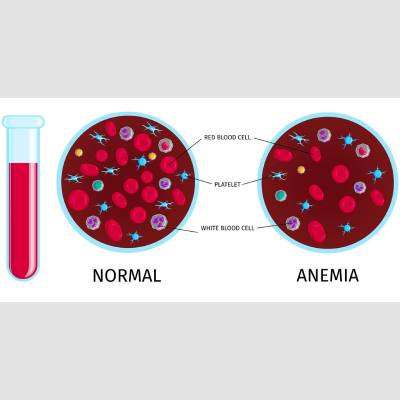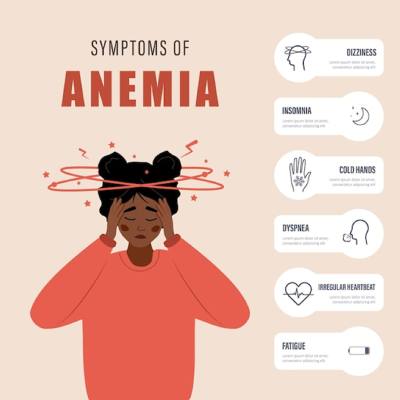Introduction
Anaemia is not in itself a disease, it just gives an indication towards various medical conditions associated with diseases. Anaemia refers to a reduction of red blood cells count or decreased haemoglobin level.
Understanding Anaemia
Anaemia manifests through symptoms like weakness and fatigue, stemming from reduced red blood cell production or their rapid destruction. Causes vary, from haemorrhage to deficiencies in iron, vitamin B12, or folic acid.
- Pernicious anaemia
Pernicious anaemia is a disease where not enough red blood cells are produced due to a deficiency of vitamin B 12.commonly results from lack of intrinsic factor, due to autoimmune attack on the cells that create it in the stomach.

Types of Anaemia
Anaemia is not in itself a disease, it just gives an indication towards various medical conditions associated with diseases. Anaemia refers to a reduction of red blood cells count or decreased haemoglobin level.
- Pernicious anaemia
This type of anaemia arises from an autoimmune disorder where there is atrophy of gastric mucosa with the resultant decrease in parietal cells & intrinsic factor is required to absorb vitamin B 12. So, in Pernicious anaemia, defective absorption of vitamin B 12 is the cause & not its nutritional deficiency.
- Haemolytic anaemia
it is a result of destruction of red blood cells as in malaria, & abnormal red blood cells prone to breakage as Sickle cell Anaemia.
- Thalassemia
an inherited disorder in which the haemoglobin production is impaired
Causes
- Haemorrhage
after accidental trauma, heavy bleeding during periods in women or bleeding during childbirth, bleeding during medical conditions like gastric ulcers, inflammatory bowel disease, cancer of gut –like hookworm, Schistosomiasis.
- Iron Deficiency
it is common during pregnancy & lactation. From acute & chronic blood loss. Lack of iron rich diet, impaired absorption.
- Deficiency of Vitamin B12 Or Folic Acid
it leads to Megaloblastic Anaemia
Symptoms
- Dizziness
- Insomnia
- Cold Hands
- Dyspnea
- Irregular Heartbeat
- Fatigue

Diagnosis
usually based on – history –medical, family history
Investigations
- Haematology:CBC MACROCYTIC ANAEMIA WITH LEUCOPENIA & THROMBOCYTOPENIA.
- Biochemistry: low level of serum vitamin B12
- Immunology:parietal cell & intrinsic factor antibodies are confirmatory findings in pernicious anaemia
Homeopathy and Anaemia
Homoeopathic remedies offer a natural and side-effect-free approach to treating anaemia, whether acute or chronic. Various remedies target specific aspects of anaemia
Homoeopathic Medicines for Anaemia
- Arsenic album
this being a direct poison to the red blood corpuscles takes first rank in cases of pernicious. It produces the destructive inflammation of every part of the body where mucous membrane is found. Skin dry, rough, scaly, disturbed sleep, anxious, restless.
- Picric acid
progressive pernicious anaemia. The extreme prostration of pernicious anaemia, with a heavy tired feeling all over the body, burning pains along the spine.
- Phosphorus
it brings about important change in the blood cells especially in RBCs. Palpitation & anxiety of the heart. Hunger soon after eating.
- Crotalus horridus
this venom causes disorganisation of blood leading to haemorrhages and jaundice. Tongue fiery red, vertigo with weakness & trembling.
Benefits of Homoeopathic Treatment
- Individualised Care: Homoeopathy recognizes that each person is unique. A homoeopath will assess your symptoms, medical history, and lifestyle to prescribe a personalised treatment plan tailored to your needs.
- Gentle and Natural: Homoeopathic remedies are derived from natural substances and are known for their minimal side effects. They work in harmony with the body, promoting self-healing and overall well-being.
- Holistic Approach: Homoeopathy takes into account not only the physical symptoms but also the emotional and mental aspects of an individual. It aims to restore balance at all levels, providing comprehensive care.
- Long-Term Relief: By addressing the underlying causes of Ulcerative Colitis,homoeopathy strives to achieve long-term relief and improved quality of life.
Consulting a Homeopath
For personalised treatment, consulting a Sanjivani homoeopath is essential. Through comprehensive evaluation, including medical and family history, a Sanjivani homoeopath can prescribe tailored remedies based on specific symptoms and underlying causes. Diagnostic investigations like CBC and serum vitamin B12 levels aid in confirming anaemia types and severity.
Sanjivani Homeopathy Clinic USP
- No homoeopathy Dietary Restrictions:
Allows patients to enjoy foods like onion, garlic, and coffee, ensuring a stress-free treatment journey.
- 24/7 Online Consultations:
Enables convenient access to doctors with detailed counseling, history management, and follow-ups.
- Highly Skilled Team:
Experienced BHMS and MD doctors, supported by multilingual and professional staff.
- Patient-Centric Care:
Simplifies treatment with modern, adaptable solutions and clear communication.
Click Here for Detailed "Sanjivani USP"
FAQ's
- What is homoeopathy ?
Homoeopathy is a holistic science which belives in the law of Similia Similibus Curenter i.e Like Cures Like .It was discovered by Dr Samuel Christian Hahnemannn in 1796.
- Is there any side effects of homoeopathy?
As homoeopathic medicines are made from natural substances this medicines have no side effects and are completely safe to consume
- Is there any diet restriction to take homoeopathic medicines?
There are no diet restrictions for homoeopathic medicines. One should only avoid eating or drinking any liquid other than water at least 30 minutes before and after taking homoeopathic medicines.
Click Here for "Frequently Asked Questions."
Conclusion
The holistic approach of Sanjivani homoeopathy presents a valuable avenue for treating anaemia, addressing not just symptoms but underlying conditions. By restoring balance to the body's systems, Sanjivani homoeopathic remedies offer a promising path to alleviating anaemia and promoting overall well-being.
Disclaimer :The information provided in this blog is for educational purposes only and should not be considered medical advice. Please consult with a qualified healthcare professional before starting any treatment for Anaemia or any other medical condition.


